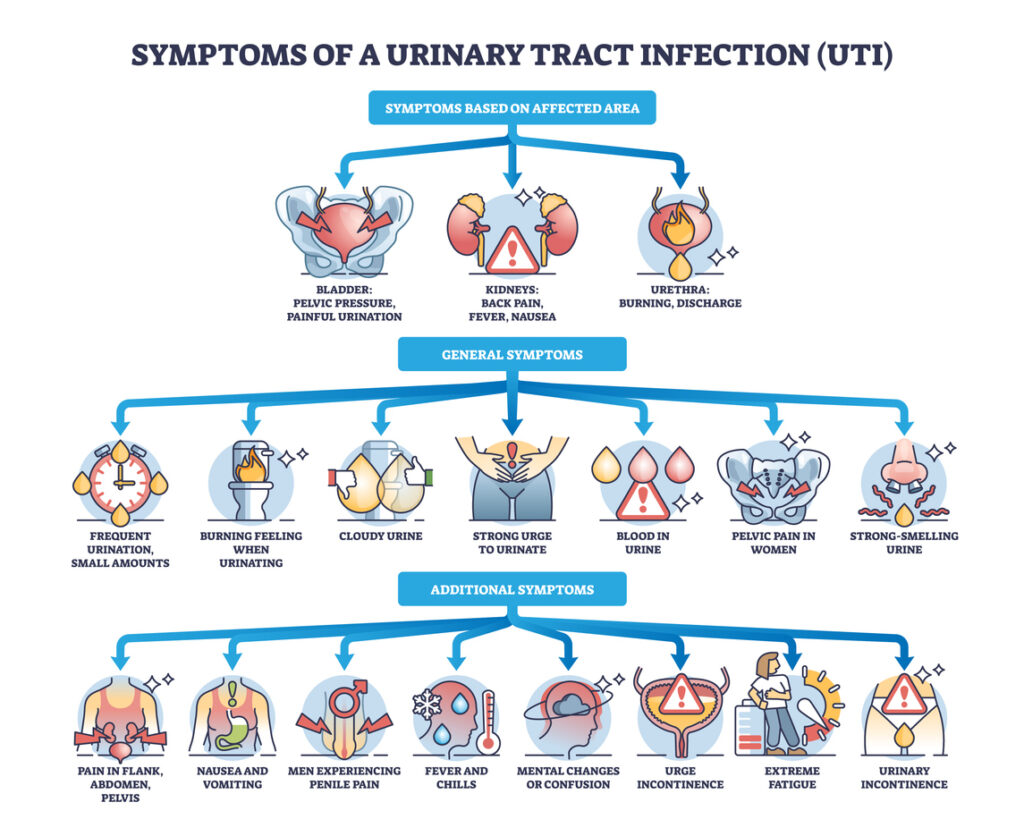For some people, urinary tract infections (UTIs) aren’t just a one-time inconvenience—they happen again and again. Recurring UTIs, defined as having two or more infections in six months or three or more in a year, can be frustrating and impact your quality of life.
At UrgentCare.com, we’re here to help you understand why UTIs keep coming back and how you can break the cycle. In this guide, we’ll explore the causes of recurring UTIs and effective strategies to stop them for good.
What Are Recurring UTIs?
A UTI occurs when bacteria, typically from the gastrointestinal tract, enter the urinary system. In some cases, even after successful treatment, the infection can return.
Recurring UTIs can happen in two ways:
- Reinfection: A new bacterial infection occurs after the previous one was treated.
- Persistent infection: The initial infection wasn’t fully cleared and returns shortly after treatment.
If you’re experiencing recurring UTIs, it’s important to identify the underlying cause to prevent future infections.
What Causes Recurring UTIs?
Several factors can contribute to recurring UTIs. Understanding these can help guide prevention and treatment efforts.
1. Anatomy
Women are more prone to UTIs due to the shorter length of the urethra, which allows bacteria to reach the bladder more easily.
2. Sexual Activity
Sexual activity can introduce bacteria into the urinary tract, increasing the risk of reinfection.
3. Postmenopausal Changes
Hormonal changes during menopause can lead to thinning of the vaginal walls and reduced levels of protective bacteria, making it easier for infections to occur.
4. Underlying Health Conditions
Conditions like diabetes, kidney stones, or a weakened immune system can increase the risk of recurrent UTIs.
5. Incomplete Treatment
Not completing a prescribed antibiotic course or improper treatment can allow bacteria to survive and cause a persistent infection.
Symptoms of Recurring UTIs
Recurring UTIs often present the same symptoms as an initial infection, including:
- Pain or burning during urination.
- Frequent or urgent need to urinate, often with little output.
- Cloudy or strong-smelling urine.
- Discomfort or pressure in the lower abdomen.
- Blood in the urine (in some cases).
If you experience these symptoms repeatedly, it’s essential to consult a healthcare provider.

How to Prevent Recurring UTIs
Preventing recurring UTIs often involves a combination of lifestyle changes, medical management, and proactive measures.
1. Stay Hydrated
Drinking plenty of water helps flush bacteria out of the urinary tract, reducing the risk of infection.
2. Empty Your Bladder Regularly
Avoid holding your urine for long periods, as this allows bacteria to multiply in the bladder.
3. Practice Good Hygiene
- Always wipe front to back after using the restroom.
- Wash the genital area daily with mild soap and water.
- Avoid harsh feminine hygiene products like douches or scented sprays.
4. Urinate After Sexual Activity
Emptying your bladder after sex helps flush out bacteria introduced during intercourse.
5. Consider Probiotics
Probiotics, found in yogurt or supplements, help maintain a healthy balance of bacteria in the urinary and digestive systems.
6. Dietary Adjustments
Incorporate cranberry products, which may help prevent bacteria from adhering to the urinary tract walls. Avoid excessive sugar, which can promote bacterial growth.
7. Discuss Preventive Antibiotics
For those with frequent infections, a doctor may prescribe a low-dose antibiotic to take daily or after sexual activity as a preventive measure.
8. Vaginal Estrogen Therapy
For postmenopausal women, vaginal estrogen creams can help restore the protective barrier in the urinary tract.
When to See a Doctor
If you’re experiencing recurring UTIs, medical evaluation is essential to identify underlying causes and develop a tailored prevention plan.
Consult a healthcare provider if:
- You’ve had multiple UTIs in a short period.
- Symptoms persist despite treatment.
- You experience fever, chills, or back pain, which could indicate a kidney infection.
How UrgentCare.com Can Help
At UrgentCare.com, we provide fast, affordable telemedicine services to diagnose and treat UTIs. Our licensed providers can evaluate your symptoms, recommend treatments, and help you prevent future infections.
Why choose UrgentCare.com?
- Convenience: Communication with a provider from the comfort of your home.
- Affordable Care: Flat $35 fee with no hidden costs.
- Expert Guidance: Personalized prevention plans tailored to your needs.
Whether you need immediate treatment for a UTI or strategies to prevent recurring infections, we’re here to help.
Final Thoughts: Breaking the Cycle of Recurring UTIs
Recurring UTIs can be a challenging and frustrating health issue, but with the right knowledge and proactive care, you can reduce their frequency and severity. By staying hydrated, practicing good hygiene, and working closely with a healthcare provider, you can take control of your urinary health.
At UrgentCare.com, we’re here to support your journey to better health with expert advice and convenient telemedicine services.
Ready to take the first step? Visit UrgentCare.com today and say goodbye to recurring UTIs!
